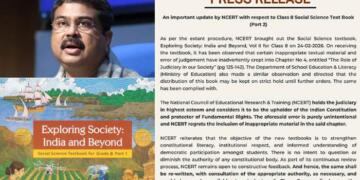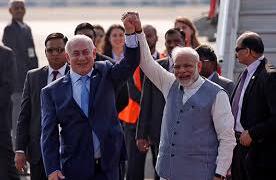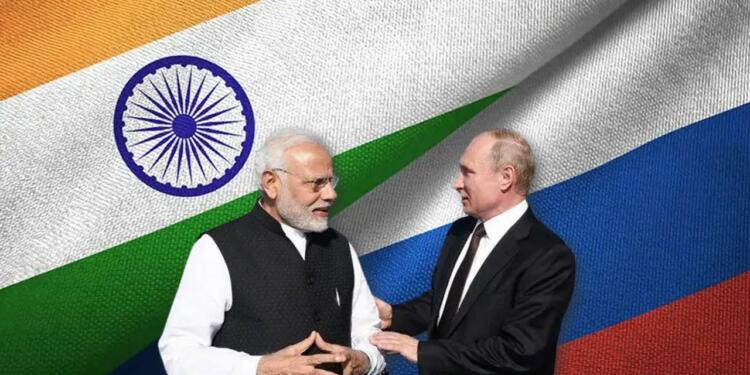India-Russia trade deal: India’s neutrality and interest-based foreign policy is reflected in its trade relations. As per Commerce Ministry data, India-US trade increased by 7.65 percent to register a figure of 128.55 billion USD in FY23. With it, the US has continued to be India’s top trading partner in FY23.
The US became India’s biggest trading partner by replacing China, which stood in second place. This year, trade with China declined by about 1.5 percent and stood at 113.83 billion USD. Further, with 76.16 billion USD, the UAE was the third largest trading partner of India.
But you may be thinking, How do trade numbers and trading partners explain neutrality in India’s foreign policy? Here comes the shocker for many geopolitical experts, especially those who judge geopolitics in binary terms, that is, camps or blocs.
India-EAEU FTA
Despite the Western sanctions on Russia amid the ongoing European conflict, India-Russia trade deal has witnessed a sharp rise. The Finance Minister, Nirmala Sitharaman, recently stated that India may keep buying discounted Russian oil even above the price cap imposed by the West.
With around 45 billion USD in trade between April 2022 and February 2023, Russia is India’s fourth-largest trading partner. Now, the latest development hints that within a few years, Russia can quickly jump to the second place only behind the US.
Also read: India’s Fueling Role in Europe’s Russian Oil Addiction
Recently, the Russian Deputy Prime Minister Denis Manturov visited India to enhance India-Russia trade deal partnership with India, as he also holds the trade ministry portfolio. He listed India among Russia’s “trusted foreign partners”. He remarked that both nations are working on an agreement to protect investments. Optimistic with the rise in bilateral trade with India, Russia has been trying to broker a Free Trade Agreement (FTA) between India and the Eurasian Economic Union (EAEU).
The EAEU is an economic union of some post-Soviet nations that are located in Eurasia. A treaty for the EAEU was signed on 29 May 2014 by the leaders of Belarus, Kazakhstan, and Russia, and came into force on January 1st, 2015. Later, Armenia and Krgyzstan also joined the grouping.
Indian Foreign Minister Dr S Jaishankar and Russian Deputy PM Denis stated that India and Russia are discussing a FTA involving the EAEU. The FTA will allow the two partners to collaborate in key areas such as oil and gas, gold and diamond mining, timber, pharmaceuticals, agriculture, aviation, railways, and logistics.
Both the ministers spoke at the India-Russia Business Dialogue, which was hosted by the Federation of Indian Chambers of Commerce and Industry (FICCI). It was held prior to the bilateral meeting of the intergovernmental commission on trade, economic, scientific, technical, and cultural cooperation.
The surge in India-Russia trade deal is largely driven by India’s increased purchases of discounted Russian crude despite Western sanctions on Moscow. India has refrained from publicly criticising Russia for its aggression on Ukraine and has called for a peaceful resolution to end hostilities. While Russia has already emerged as one of India’s top energy suppliers.
Russian Deputy PM Manturov said, “We pay special attention to the issues of mutual access of production to the markets of our countries. Together with the Eurasian Economic Commission, we are looking forward to intensifying negotiations on a free trade agreement with India.” The Russian Minister also stated that Russian and Indian businessmen would be interested in trade preferences and mechanisms that could ensure the protection of investments.
Also read: Blinken is not in India for India, he is here for Russia
Dr Jaishankar in no mood to give easy pass to Russia either
Dr. Jaishankar noted that the COVID-19 pandemic halted the FTA negotiations between India and the EAEU. He added that the External Affairs Ministry would support the resumption of the negotiations because the proposed agreement would make a real difference in our trade relations.
The COVID pandemic became a roadblock in FTA negotiations with the EAEU, which started in 2017. However, Dr. Jaishankar stressed that there is an urgent need to address the trade imbalance between the two nations, which has crossed $45 billion USD. He highlighted that India and Russia have already achieved the $30 billion bilateral trade target before its initial schedule in 2025.
Dr. Jaishankar expressed concerns that the increase in two-way trade has given rise to “understandable concern” about trade imbalance. He further remarked that the two sides need to work urgently to address this imbalance. This can be done by tackling impediments, including market access, non-tariff barriers, payment-related matters, and logistics.
Additionally, the two sides can also diversify and expand the basket of goods by exploring possibilities in automobiles and spare parts, electronics goods, medical devices, solar photovoltaic modules, textiles, food, and agricultural products.
Both the Indian and Russian ministers tacitly hinted at the problems created by Western sanctions on Russia, especially in terms of trade settlement. To overcome this, India and Russia have agreed on Rupee-Rouble trade. However, due to some bottlenecks, it was claimed that the use of currencies from third countries was being considered, which is an area of concern going forward in bilateral trade.
Also read: The last thing India wants is Russia becoming the satellite state of China
In a clear message to the Russian side, Dr. Jaishankar echoed India’s concerns and subtly hinted that India would like the Russian side to appreciate India’s concerns and redress these impedences that irk the Indian side. He stated that there could be an inadequate appreciation of the concerns and risks that the Indian businesses face on the Russian side. He went further to remark that the future of bilateral economic cooperation requires the willingness and ability to look at it from the point of view of the other party and come up with solutions that will overcome the obstacles.
For this, Dr. Jaishankar listed payments, logistics, and certifications as the key areas. The intergovernmental commission meeting will cover the payment issue, and it will include discussing network development under the scheme for international trade settlement in Indian rupees using special Rupee vostro accounts.
Russian Deputy PM Manturov ensured smooth mutual settlements would give further impetus to India-Russia trade deal. As per media reports, Russia will propose the possibility of a wide use of national currencies and currencies of friendly countries to minimise expenses and currency risks at the intergovernmental dialogue.
Also read: India and Russia: Strengthening defence ties through 5th Generation Aircraft development
Russian Deputy PM lays red carpet for Indian companies
Russian Deputy PM Denis further stated that Russia relies on “trusted foreign partners” like India for certain components and technologies, and Indian companies can help Russia in meeting the growing demand for road construction equipment, chemicals, and pharmaceutical products.
In return, the Indian firms can also benefit from Russia’s “cluster investment platform,” which provides preferential credit, insurance premiums, and income tax preferences for manufacturing priority products.
As per officials, the Russian Minister also met with Indian Commerce Minister Piyush Goyal and discussed various issues concerning trade and commerce. Apart from that, Manturov also met with Indian NSA Ajit Doval and discussed a range of bilateral issues to implement the India-Russia strategic partnership.
Dr. Jaishankar’s remark in the backdrop of these promising FTA negotiations underscores the fact that India is enthusiastic about signing more and more FTAs but not at the cost of Indian concerns. When the Russian Minister lauded every aspect of the growing trade, Dr. Jaishankar didn’t hesitate to call a spade a spade and categorically put India’s concerns forward before going any further in trade negotiations.
However, these bottlenecks are easy to address and remove, thus paving the way for a mutually beneficial India-Russia trade deal between India and the EAEU that will fasten India’s growth trajectory as if it had gotten a nitro boaster attached to it.
Support TFI:
Support us to strengthen the ‘Right’ ideology of cultural nationalism by purchasing the best quality garments from TFI-STORE.COM

























